New Delhi: Scores of people have been detained in Delhi and several in Bengaluru as people carried out marches to protest the citizenship law Thursday, exactly a week after President Kovind gave his assent to the amended bill.
In Delhi, police detained protesters near Red Fort when they tried to take out a march in defiance of the prohibitory orders imposed. Swarajya Abhiyan chief Yogendra Yadav was among those detained, officials said. In total, 1200 protesters have been detained, with 350 being taken to Suraj Mal Stadium in Nangloi and Rajiv Gandhi Stadium in Bawana.
However, no untoward incident was reported during the protests, the Delhi Police said.
Apart from police personnel, 52 companies of other forces, including RAF, were deployed to maintain law and order, Delhi Police PRO Mandeep Singh Randhawa said.
Meanwhile, Mumbai, Ahmedabad, Mangaluru, Lucknow, and parts of Kerala are also seeing protests against the Citizenship law as well as the violence used against protesters.
Protests in Mangaluru took a violent turn after some protesters resorted to stone-pelting. In response, the police started lathi-charging and using teargas on the crowd. Shops in the area were shut. There was no traffic movement.
Activists and students in Delhi were reportedly dragged into buses in a bid to clear the area. Holding placards and shouting slogans, the protesters allowed themselves to be escorted to the buses.
“I know many of our mates are being detained, despite that many have gathered here. The citizenship of this country cannot be divided and this is our protest call today,” Yadav said.
Two protests are scheduled in the national capital, one by students and activists and the other by left parties. The two marches are to meet at Shaheedi Park near ITO.
Nineteen IndiGo flights were cancelled at the Delhi airport and 16 others were delayed as crew members were stuck in traffic jam at NH-8 due to anti-CAA protests.
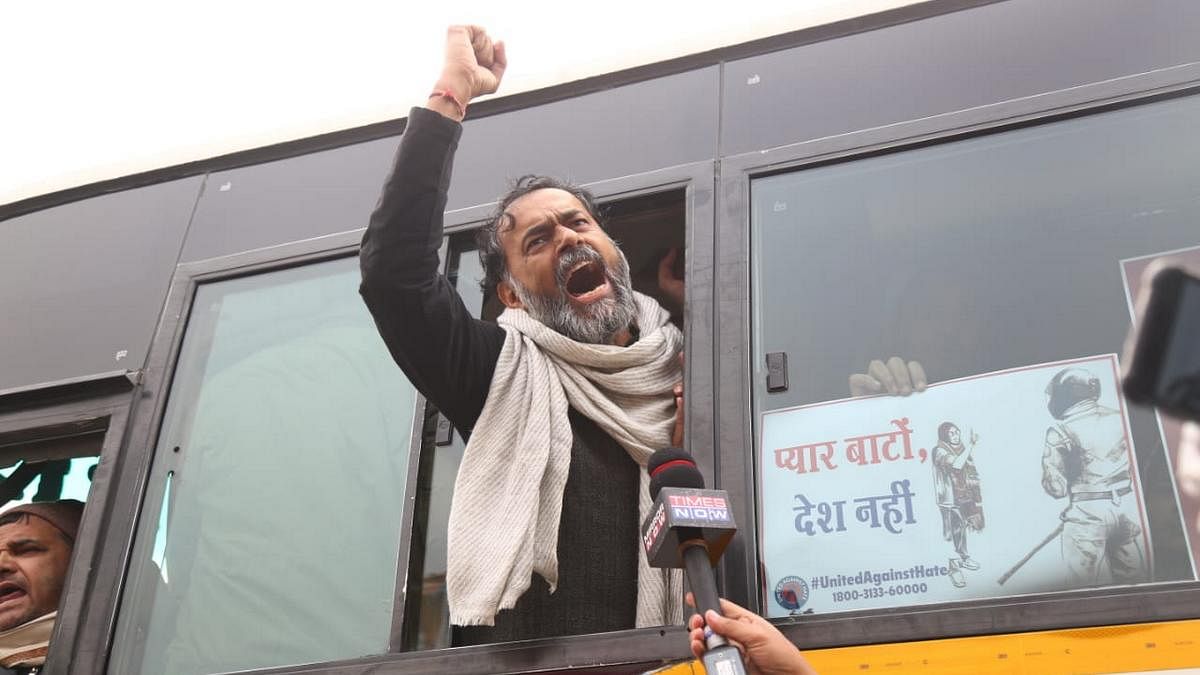
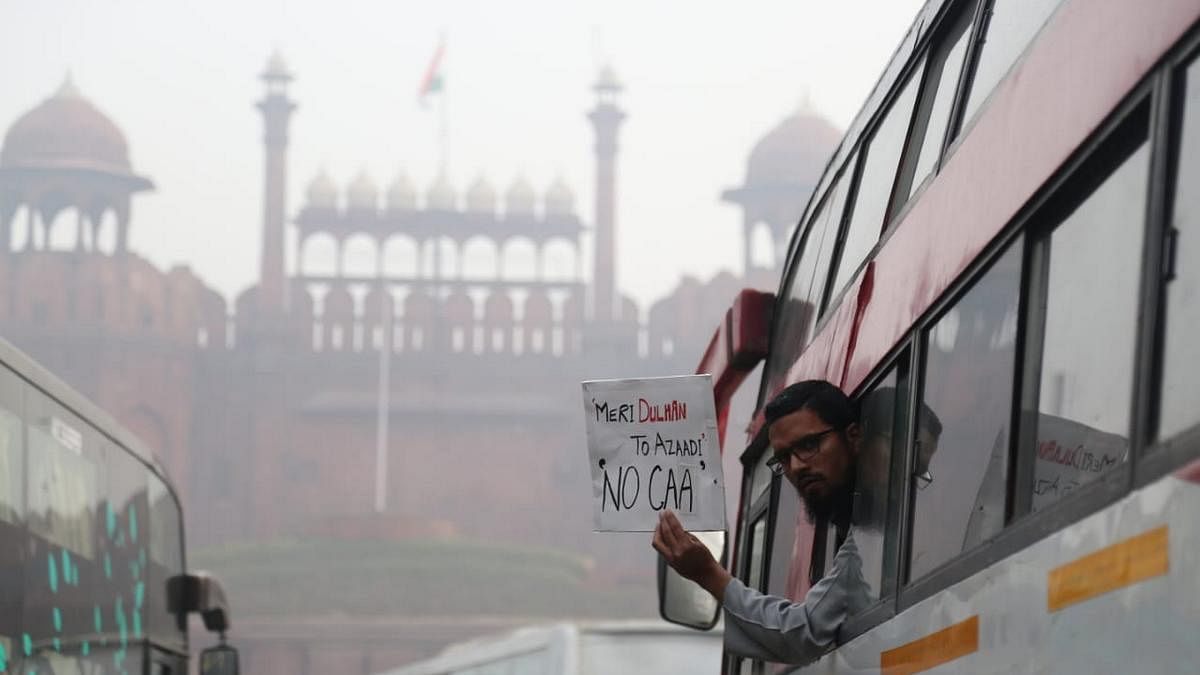
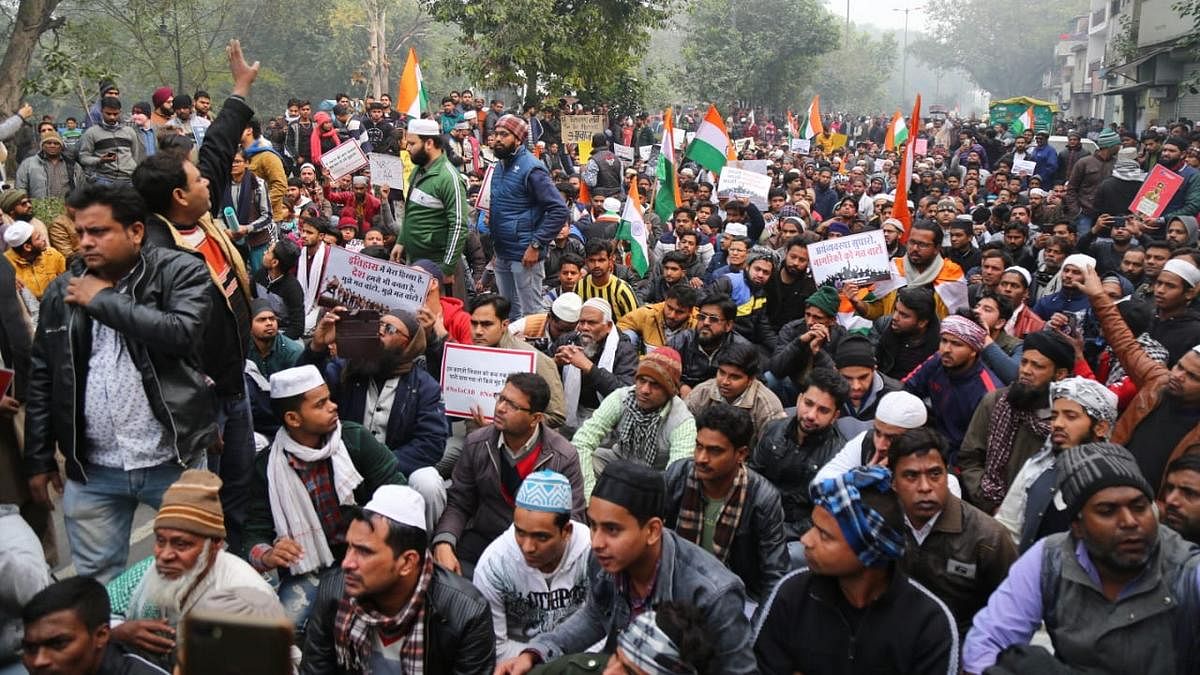
The Delhi Metro Railway Rail Corporation (DMRC) announced that entry-exit to 19 metro stations around central Delhi have been shut and trains stops at several stations have been cancelled.
Airtel and Vodafone responded to queries on Twitter saying internet connectivity has been shut down in some areas following government orders.
Hi! As per the directive received from the Government, Services are stopped at few locations (Jamia, Saheen bagh, Bawana, Seelampur, Jaffrabad, Mandi House and part of Walled city). As a result of this you will not be able to use services till 1pm at these locations <1/2>
— Vodafone (@VodafoneIN) December 19, 2019
Section 144, which prohibits assembly of four or more people, has been imposed in parts of Delhi and Bengaluru.
Historian Ramachandra Guha, who was at a protest rally in Bengaluru, was also detained along with around 30 others, according to news channels.
The detentions were criticised by politicians and public figures alike.
Actor and Makkal Needhi Maiam chief Kamal Haasan, West Bengal chief minister Mamata Banerjee, and author Arundathi Roy were among those who condemned the detention of protesters.
In Ahmedabad, MLA Jignesh Mevani was also detained by police.
Also read: Liberal, secular opposition to CAA must not allow room for Islamic and Left radicals
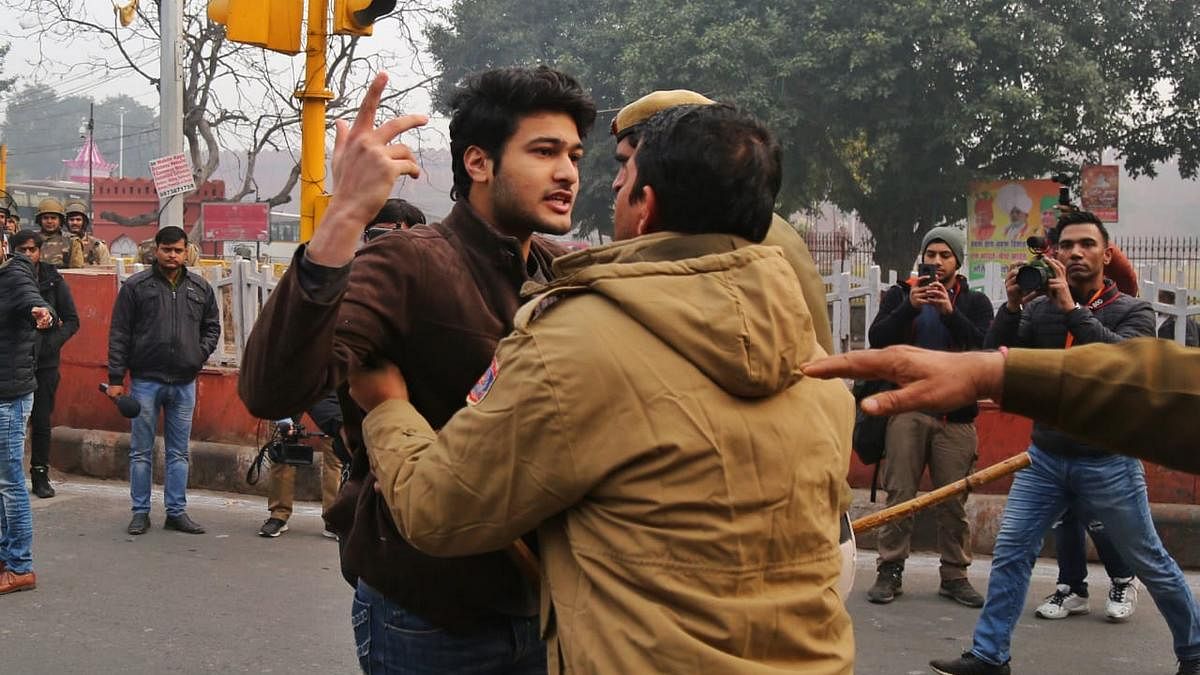
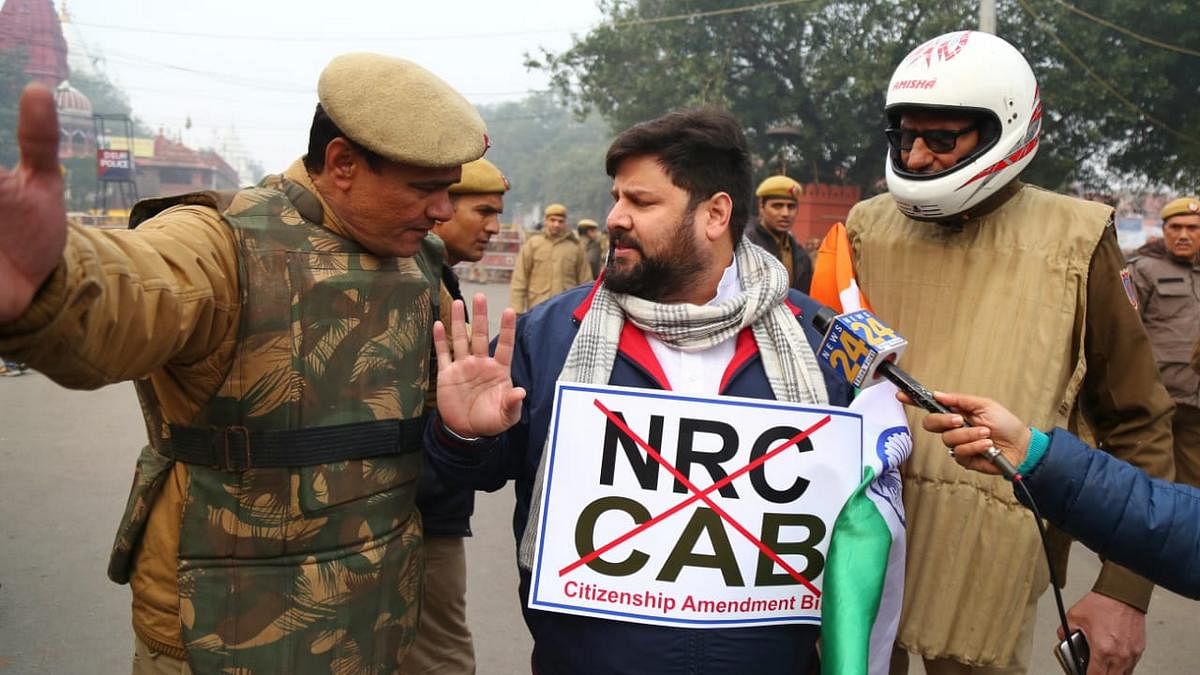
Also read: Traffic restrictions to thwart CAA protests bring Delhi to a halt
Protests across the country
Thousands of protesters took to the streets in Mumbai, converging at the August Kranti Maidan, where Mahatma Gandhi in 1942 told the British to quit India. The gathering included workers of political parties, students and few Bollywood actors like Farhan Akhtar, Sushant Singh, Swara Bhaskar and film makers Rakeysh Omprakash Mehra and Saeed Mirza were also present at the Maidan.
Members of Muslim community organised anti-CAA protests in Malegaon in Nashik district and at Paratwada in Amravati district.
A pro-CAA gathering was organised outside the Churchgate railway station not far away.
Similar protests were held in Pune, Nagpur and various other cities in Maharashtra.
Violent protests broke out in Lucknow Thursday afternoon when a mob pelted stones and torched vehicles parked outside a police post.
At Aligarh Muslim University, which had witnessed police crackdown against its students last week, several teachers held silent march opposing the CAA.
The opposition Samajwadi Party and Congress legislators also held protest at the legislative assembly complex even as prohibitory orders remained imposed across Uttar Pradesh.
The SP and Congress MLAs gathered at the Assembly building ahead of the sitting of the state legislature but held separate protests, despite tight security arrangements, and raised slogans against the contentious legislation.
In Ahmedabad, police baton-charged some people who gathered in Sardar Baug area to protest against CAA and NRC.
West Bengal, Assam and Meghalaya, which have been witnessing protests for days, were peaceful while agitators blocked rail and road traffic during a bandh called by Left-wing student organisations in Bihar.
Train services were affected and roads blocked during a bandh called by Left parties in Bihar. The bandh is being supported by smaller parties too.
In Patna, activists belonging to pro-Left student bodies like AISF and AISA stormed the Rajendra Nagar Terminus and squatted on the tracks disrupting movement of trains for about half an hour early in the morning.
The protests against the law picked up last week when the Citizenship (Amendment) Bill was tabled in Parliament. Protests in Assam and Tripura turned violent, resulting in the Centre deploying the Army to maintain law and order. After Parliament passed the bill, President Kovind gave is assent, leading to student bodies in Delhi protesting the contentious law.
Sunday saw the protests reach a tipping point when students of Jamia Millia University in Delhi and Aligarh Muslim University in UP clashed with police. In both cases, students alleged police brutality and the matter has been taken up in Supreme Court.
Also read: ‘Refuse to remain silent’ — Romila Thapar, Noam Chomsky & others condemn Jamia ‘brutality’
What is the contention
The Citizenship (Amendment) Act assures Indian citizenship to refugees fleeing religious persecution from three countries — Pakistan, Bangladesh and Afghanistan. However, the law is applicable only to members of Hindu, Sikh, Buddhist, Jain, Parsi and Christian communities, resulting in critics calling it an anti-Muslim legislation.
Home Minister Amit Shah assured the bill had no bearing on Indian Muslims and would not affect the citizenship of Indians.
In Assam, the law, coupled with the Nation Register of Citizens (NRC), has brought the state to a point where it feels alienated and wronged by the Centre, and ‘mainland’ India.
The law would be less potent, but for the backdrop of the National Register of Citizens (NRC) recently updated in the state. The NRC identifies those who immigrated to Assam illegally from Bangladesh post 24 March 1971 — a long-standing demand of the indigenous people and one that was laid down in the Assam Accord.
The ethnic Assamese have held a long-standing resentment towards the ‘outsider’ — irrespective of ethnicity, religion or citizenship. What the new law essentially does is segregate the 19-odd lakh people left out of the NRC into Hindu and Muslim refugees, promising to grant citizenship to the former, which happens to be incompatible with the demands of the state.
Also read: Assam’s old 1970s fury back with Citizenship Act. This time for a new, young generation
(With PTI inputs)


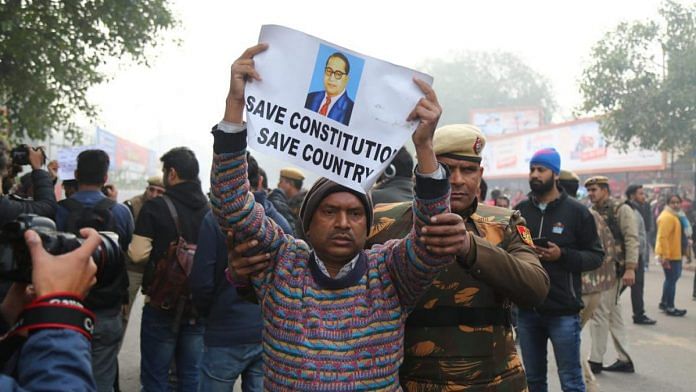

Shah needs to go. He is behind the brutality. If he stays, expect more barbaric behaviour from the police.
Govt should not bow to mob violence. Islamist and Leftist terror should be crushed.
Govt should bow to the expressed will of the citizens. Police terror should be punished. Shah should resign.
I have never seen Ramchandra Guha so angry – in fact, never seen him angry at all. One cop grabbed him, violating his bodily integrity, another bunched up his fist, as if to punch him. Our global image is melting faster than the Himalayan glaciers.
At last, the under-employed historian Ramachandra Guha finds some reason to see his name in the media, after a very long interval!
In Assam , Assamese middle classes found
educated Bengali Hindu refugees as their competitors and was agitated for this fact ignoring the fact that sylhet , a district in Bangladesh now , from where most Bengali Hindu refugees came was a part of Assam.
Well done. There are hundreds of thounsands with you. CAA must be taken back and NRC scrapped. Shah should resign.